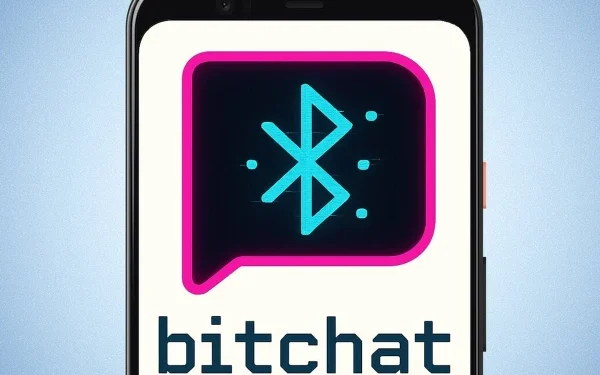San Francisco – In a move that could revolutionize digital communication, Jack Dorsey, the renowned co-founder and former CEO of Twitter (now X), has officially launched a decentralized, offline messaging app designed to compete with traditional messaging platforms like WhatsApp.
This bold new entry into the tech space is not just another chat app—Dorsey’s creation is a fully encrypted, serverless, Bluetooth-based platform that can function without internet connectivity, offering a private and anonymous communication alternative. The app, called BitChat, is now available for download on the Apple App Store in beta form.
A New Era of Offline, Decentralized Messaging
Built in a Weekend, Designed for Privacy
According to Jack Dorsey, BitChat was conceived and built in a single weekend. His primary objective was to create a messaging solution that addresses growing concerns around privacy, surveillance, and centralized data collection.
In an announcement made via X (formerly Twitter), Dorsey emphasized the importance of data autonomy and private communications, stating that the app is a response to the increasing consolidation of user data by large tech firms like Meta (which owns WhatsApp) and Google.
“No phone number, no email, no server. Just you and the people around you,” Dorsey wrote in his post introducing the app.
How BitChat Works: Bluetooth Mesh Networking Explained
Communication Without the Internet
BitChat relies on a Bluetooth mesh network, a decentralized networking method where devices connect directly to each other within a specific range—up to 300 meters (approximately 1,000 feet). Messages sent using BitChat are relayed through nearby devices, forming a network of connected users without ever needing a central server or cloud infrastructure.
This is a form of peer-to-peer (P2P) networking, where each smartphone becomes a node, capable of both sending and relaying messages. As more devices join the network, the range and reliability of the system increase.
This innovative approach offers several advantages:
- No internet or cellular data required
- Zero reliance on telecom providers or Wi-Fi
- Total privacy with end-to-end encryption
- No risk of server downtime or censorship
Key Features of BitChat: A WhatsApp Alternative for the Privacy-Conscious
The white paper released alongside the app provides a deep dive into the platform’s core features. Here’s what sets BitChat apart from conventional messaging apps:
1. Fully Decentralized Communication
There are no central servers involved. Unlike WhatsApp or Signal, which rely on data centers and server routing, BitChat operates on device-to-device connections. This means:
- No third party can intercept or store your messages.
- There is no single point of failure or shutdown.
- Users retain full control over their data.
2. Anonymous Usage
Users do not need to provide a phone number, email address, or any personal information to register or use the app. This makes BitChat one of the most anonymous messaging platforms available today.
3. End-to-End Encryption
Messages are fully encrypted, ensuring that only the sender and the intended recipient can read them. Even if intercepted during transit across devices, the content remains unreadable without the appropriate encryption keys.
4. Offline Capability
The app works in environments where internet access is unavailable or unreliable, such as:
- Remote areas and rural regions
- Natural disaster zones
- Political protests or conflict zones
- Airplane mode or emergency situations
A Strategic Move Amid Global Privacy Concerns
The Surveillance Economy and Its Discontents
BitChat’s launch comes at a time when global concern over digital surveillance is on the rise. With governments, corporations, and even cybercriminals capable of tracking users through IP addresses, GPS locations, and social graphs, the need for truly private communication tools has never been greater.
Jack Dorsey has long been a vocal advocate of decentralization and privacy. After stepping down from Twitter, he has focused heavily on blockchain-based initiatives, including Bluesky, a decentralized social media protocol. BitChat is a natural extension of this philosophy.
In a recent blog post, Dorsey wrote:
“The future of communication must prioritize user freedom, privacy, and independence from centralized power.”
Potential Use Cases for BitChat
BitChat opens up a new world of possibilities for communication, especially in scenarios where traditional networks are inaccessible or compromised:
1. Disaster Response and Emergency Communication
During natural disasters, when cell towers are down and internet services are unavailable, BitChat can be used by rescue teams, NGOs, and citizens to maintain contact.
2. Protests and Political Activism
In authoritarian regimes where messaging platforms are monitored or blocked, activists can use BitChat to organize and communicate securely, without leaving digital footprints.
3. Off-Grid Adventures
Travelers and explorers in remote locations can stay in touch with each other even in zero-connectivity zones like mountains, forests, and deserts.
4. Events and Festivals
Large gatherings such as music festivals, conventions, and sports events can deploy BitChat for secure, localized communication without overloading mobile networks.
Challenges and Limitations
While BitChat’s concept is groundbreaking, there are certain challenges and limitations that need to be addressed as the platform scales:
Limited Range
The 300-meter Bluetooth range means that the app is primarily effective in densely populated or closely connected environments. Sparse networks could lead to message delays or delivery failures.
Battery Usage
Maintaining constant Bluetooth communication can be power-intensive, potentially draining phone batteries more quickly than traditional apps.
Adoption and Network Effect
For BitChat to be truly effective, it requires a critical mass of users. The more devices in the mesh network, the better the performance. Gaining widespread adoption could be a hurdle, especially when competing with entrenched apps like WhatsApp, Telegram, and Signal.
The Future of BitChat and Decentralized Messaging
Despite these limitations, BitChat represents a bold step forward in the evolution of digital communication. As interest in decentralized technologies and offline-first solutions continues to grow, apps like BitChat could play a major role in shaping the future of secure messaging.
Tech experts suggest that BitChat could also be integrated with blockchain networks, decentralized identity systems, or even IoT (Internet of Things) devices for more advanced functionality in future versions.
Public Reaction and Industry Buzz
The tech community has responded with excitement and curiosity. Early reviews on tech forums and social media praise the app’s:
- Innovative concept
- Simplicity and user-friendliness
- Focus on privacy
Privacy advocates and cybersecurity professionals have also expressed support, seeing BitChat as a valuable tool in the fight for digital sovereignty and data independence.
WhatsApp’s Growing Competition
BitChat enters a market that has already seen disruption from Telegram, Signal, and Threema—platforms that prioritize privacy and encryption over traditional data collection models.
While WhatsApp remains the dominant player with over 2 billion users, growing criticism over its data-sharing practices with parent company Meta has created an opportunity for decentralized alternatives to thrive.
If BitChat can evolve with features like file sharing, group chats, and media support—while preserving its offline-first design—it may become a mainstay in the privacy-first communication space.
Conclusion: BitChat is More Than Just a Messaging App
BitChat isn’t just a WhatsApp alternative—it’s a philosophical statement. It’s about reclaiming the right to communicate freely, without oversight, surveillance, or dependence on corporations. Jack Dorsey’s minimalist yet revolutionary app challenges the status quo and paves the way for a new kind of digital interaction—one that respects autonomy and anonymity.
As adoption grows and the app matures, BitChat could become a powerful tool in the arsenal of digital freedom, helping individuals around the world communicate on their own terms.

























